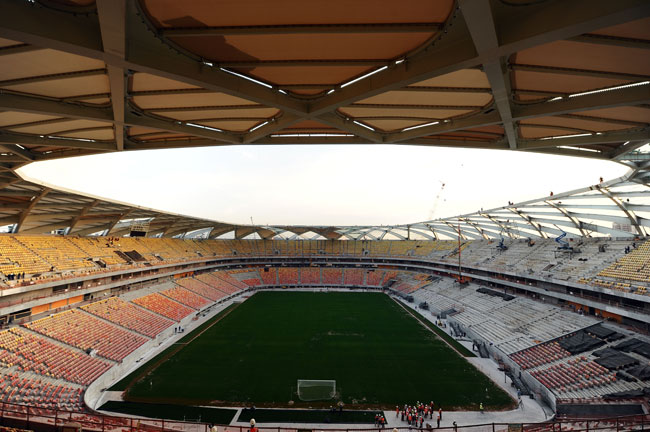In the last 5 rounds of the Brazilian Championship – from the start of next month – the home teams will have to play at home.
This might seem a banal observation. In fact, though, it carries a certain significance. It is a measure aimed at cutting out one of the more bizarre practices in the Brazilian league – that of the home side waiving its right to play in its own stadium, and, usually for a financial incentive, instead staging the game in another part of the country. It is a habit which has only grown since the construction of stadiums for the World Cup, some of which are little used. It is not uncommon, then, for clubs from elsewhere to take their matches to Brasilia, or Manaus, for example. It is not a World Cup stadium, but recently the Estadio de Café in Londrina hosted the game between all-but-relegated America of Belo Horizonte and championship leaders Palmeiras of Sao Paulo. Instead, then, of the relatively small crowd who usually cheer on America, the ground was full of Palmeiras fans. America lost any home advantage, but gained from a financial point of view.
The championship, though, was the clear loser. Such measures are in clear breach of the fundamental ethics of a league competition – that all the sides meet each other on a home and away basis. Other clubs had to face America in their Independencia stadium in Belo Horizonte. So too, then, should Palmeiras.
Brazil’s FA, the CBF, would seem to agree – although belatedly. Last week they announced the ban, “with the objective of preserving the technical balance of the competition and of avoiding any type of favouritism in the final stages.” It begs an obvious question; why only in the final stages? Does the CBF really believe that technical imbalance and favouritism of this type are acceptable as long as they take place earlier in the campaign?
Many argue that the practice of ‘selling’ home games is valid because it gives the stadiums in Brasilia, Manaus and so on something to do. This is to miss the point. Quite apart from any ethical considerations, it is far from clear that any long term purpose is served by artificially creating matches to be staged in these new grounds. There is only one way that a stadium in Brasilia, Manaus or anywhere else can have a chance of becoming viable – if a local team have sufficient appeal to fill it on a regular basis. And the possibility of these local sides attracting a mass following is probably not helped by visits of traditional glamorous clubs from elsewhere. How can the local team compete? The practice of ‘selling’ home games, then, is probably a threat to the national development of the game as well as to the integrity of the championship.
And, thankfully, another threat to the integrity of the championship has been seen off. It all began some 10 days in the Fluminense-Flamengo clash. Second placed Flamengo were 2-1 ahead inside the last ten minutes when their old Rio rivals thought they had scored an equaliser. But Henrique’s header was ruled out for offside – correctly. But under pressure of protests the referee, Brazil’s World Cup official Sandro Meira Ricci, at first appeared to over-rule his linesman and give the goal. There then followed a free-for-all of protestation until, after a 13 minute hold up, the goal was finally disallowed.
https://www.youtube.com/watch?v=9yTxBM_uXcM
The right decision had been reached – the problem was that it may not have been reached by strictly legal methods. Did someone tell Ricci that the TV images showed that Henrique was indeed offside? Fluminense thought so, and appealed to Brazil’s ever controversial sports justice tribunal, the STJD. They originally accepted the appeal, and Flamengo were docked the three points pending an investigation. It was a disastrous decision. This is an environment in which everyone complains about refereeing all the time. Club presidents are forever playing to the gallery with cheap lines about how their institution is the victim of a conspiracy. Before long relegation threatened Figueirense were also seeking the annulment of their 2-1 defeat to leaders Palmeiras, based on refereeing errors.
With the entire championship at risk of being decided in the courtroom, the STJD wisely backed off. Flamengo had their three points returned, and hope also returned that the local media might start talking more about players, less about referees.







